Erasmus+ Journal (Issue 3) 2014/15
Kathrin Hoffelner, Miriam Krammer, Windesheim University, The Netherlands, Mobility for Study, PHST
Authors: Kathrin Hoffelner, Miriam Krammer
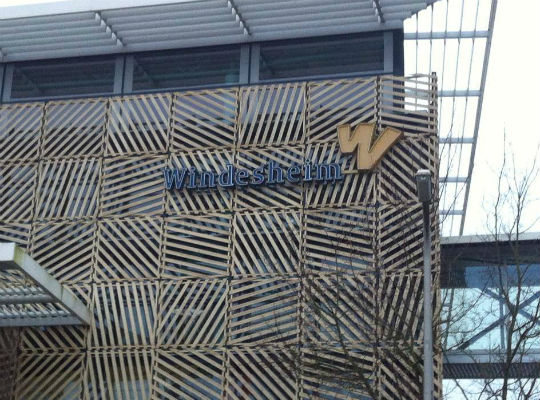
Windesheim University (Building C)
Contact of university in Zwolle:
Windesheim Zwolle
Campus 2-6
8017 CA Zwolle
Contact of the Erasmus office:
Coordinator: Christel Vels
International Office Windesheim
P.O.Box 10090
8000 GB Zwolle
The Netherlands
Description of the university:
With 20.300 students, thousands of other study participants and more than 1.800 members of staff at sites in Zwolle and Almere, Windesheim is one of the biggest universities of applied sciences in the Netherlands.
It's a community organisation, within which people acquire, share and utilise expertise together. At Windesheim you get challenged and empowered to develop into a responsible, principled a confident professional.
Chosen courses:
Pedagogy and Didactics in Dutch Schools:
This course covers a wide range of topics concerning pedagogy and methodology. Theory is put into practice during the lesson.
Goal: learn how to approach pupils with learning problems or disabilities
Career Coach Counselling:
In this module you will reflect your own personal qualities as a teacher.
goal: personal development in your chosen subject
Dutch School system:
Here we get to know how the Dutch school system works. We will also learn about many more specific aspects of the Dutch educational system.
Goal: get to know the Dutch School System
Internship Intermediate A:
-observing the teacher/ class
- communicating with students
- interviewing the teacher
- getting to know differences in learning abilities and learning styles between students and learning how to take these differences into account during the work as a teacher
- preparing and performing educational activities
- cooperating with teachers and fellow students
- participating in school activities
- reflections
Internship Intermediate B:
-observing the teacher/ class
- communicating with students
- interviewing the teacher
- getting to know differences in learning abilities and learning styles between students and learning how to take these differences into account during the work as a teacher
- preparing and performing educational activities
- cooperating with teachers and fellow students
- participating in school activities
- reflections
Windesheim and the Netherlands, introduction module of several Dutch aspects analysed in an international perspective
Dutch language 1: Introduction
This module will teach Dutch up to a basic level. Therefore, it focuses on communication and not on grammar. Everyone will be encouraged to use Dutch and will be helped to feel more at ease with the Dutch language. Through training sessions that focus on communication in everyday life the language can be learned.
Dutch language 2: Intermediate
This module covers a range of topics in which Dutch language skills will be learned and practised in everyday situations, e.g. going to the cinema, shopping, asking for directions, sending a postcard, rules in public buildings/ areas and what to say at a police station. Moreover, various aspects of Dutch grammar will be discussed, including tenses, word order, compound sentences and the use of comparatives and superlatives.
Dutch Society 1
In this module you can gain an understanding of the historical development and social changes that have influenced Dutch society. Other topics covered are the spatial contrast in the Dutch landscape, economic development, distribution of the population, and the international position of the Netherlands, particularly in relation to its position within the European Union.
Dutch Society 2
The module Dutch Society 2 teaches knowledge of the Dutch legal system, multicultural society, the Dutch through foreign eyes, tolerance and water. Moreover a field trip to Zwolle and its surroundings will be organized.
Intercultural Awareness
This course will acquire the knowledge of cultural theories and develop an appropriate attitude to deal with cultural differences and other cultural aspects independently.
Drama & Improvisation
Besides having fun and exploring the field of drama and plays, there are opportunities to work on several competencies f. e. being able to reflect, being able to express yourself freely, the use of body language and much more.
Introduction module
This course is compulsory for all international students and consists of all kind of activities which are organized by Windeheim's International Office. During these activities you get to know the campus, Zwolle, learn about the culture, history, food and typical Dutch pastimes.
Arrival and some useful information about Zwolle
Arrival
There are many different possibilities to get to Zwolle. You can go by train, car, bus or airplane. We decided to go by plane. We took the plane from Salzburg and went to Amsterdam Schiphol (that was at that time the cheapest possibility). It is very practical, because the airport in Amsterdam also includes a train station. So we could take the train to Zwolle directly from the airport. Especially with a lot of luggage it is very comfortable to do it that like. At the train station in Zwolle some of our SUN mentors (students from Windesheim University, which help you during your stay) took us to the university, where we got all important information. Afterwards they took us to our chosen accommodation.
During our first week we had to go to the municipality in Zwolle to register, but all important information therefor was given to us by the international office at Windesheim.
In the first weeks we already had a lot of activities with our SUN mentors to get to know each other and get to know Zwolle. We also had an opening ceremony for the Erasmus students at Windesheim. During our stay we had some more activities with the other Erasmus students: a trip to another city, we went ice skating, we had different country presentations and a multi culti food night.
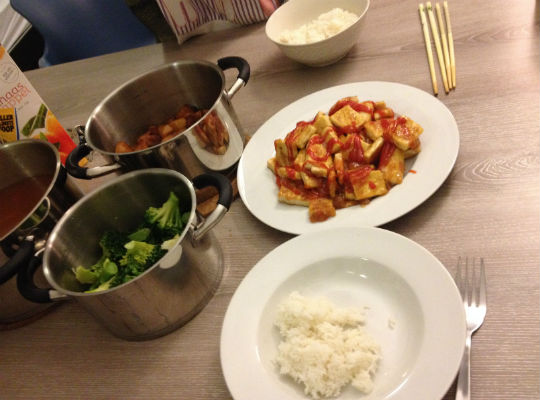
multi culti food night
Transport
The most common transport facility in Zwolle is the bicycle. The bicycles are used at each condition: rain, snow or sun. If you get the chance to buy a bicycle from a former Erasmus student, use it, because that is probably the cheapest opportunity (if you are lucky, around 30-40€)! Otherwise there are some bike shops in the city center, where you can buy a bike for approximately 70€. But do not expect a luxury bike, expect a one-speed bike with back-pedal brakes.
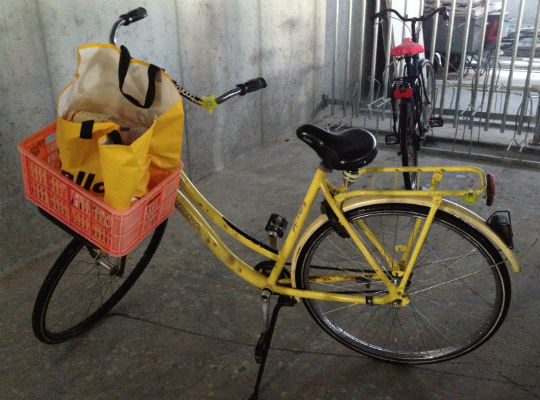
Miriam's bicycle
Zwolle has also a public transport system which consists out of buses in all directions. It is best to travel with the OV-Chipcard in the bus as well as in the train.
The OV-Chipcard costs 7, 50€ (once) and is a card, where you can upload some money for travelling. If you go by bus or train, you have to check-in when you enter the transport facility and check-out if you leave. It is also possible to buy single tickets, but with those tickets you have to pay an extra fee.
At the following website you can get more information about the trains in the Netherlands and also check the timetable.
Website: http://www.ns.nl/
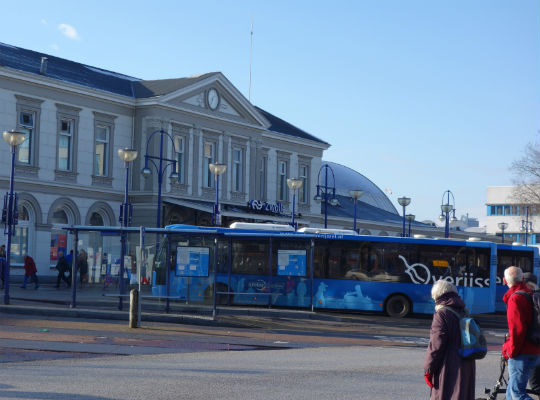
trainstation in Zwolle
Zwolle
Zwolle is located in the province Overijssel, which is nearly in the middle of the Netherlands.
It has a population around 125,000 people. Its city centre is very unique and surrounded by a water canal.
It is possible to do different leisure activities in Zwolle f.e. going to the cinema in the city center, swimming or doing sports at Windesheim university or going to one of the museums in Zwolle and furthermore.
People are very friendly in Zwolle and always offer you help, if you have any problems.
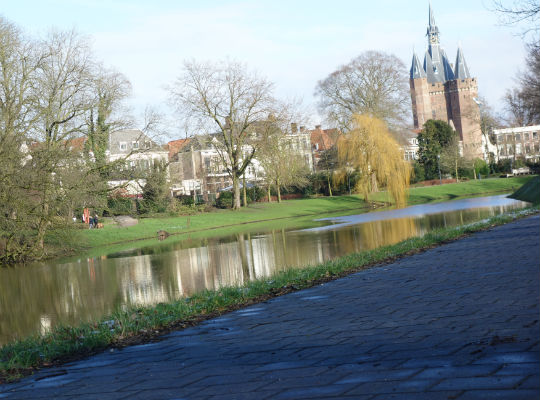
canal around the city centre
Teaching experience
School:
Van der Capellen scholengemeenschap
Lassuslaan 230
8031 XM Zwolle
T 038 - 426 28 50
E: lassuslaan@capellen.nl
We both got a spot in the secondary school called 'Van der Capellen' in Zwolle. Unfortunately they could not offer us a place in a school for special needs kids. Because of that we taught German in different classes of the school together. At first we had some sessions of observation to get to know the difference between the Austrian and Dutch school system. But just after a view lessons, they allowed us to present our home country via a power point presentation to the kids. Afterwards we focused mainly on talking with the students in German about different topics. Thereby we focused on individual talks. That was a very pleasant opportunity for us and the students could take a big profit out of that. At the end of the term we had to hand in a portfolio with all activities and assignments we did.
Application process
For applying at Windesheim university you have to fill out an application form, which is online available at the website of Windesheim university. There you can also see the nomination deadlines for the following spring and autumn semester.
Besides the application form you need to send a learning agreement (which is also available on the website), a recommendation letter from one of your teachers at PHst, a résumé aswell as a motivational letter, where you describe your motive for spending a specifc time abroad. If you need any help with those things, the international office at PHst always offers you help. Especially for the learning agreement it is very important to talk to your coordinator, that he accepts it.
It is also mandatory to participate the meetings for all Erasmus+ students at PHst, because there you get informed about organisational things.
If you are accepted at the guest university, you will get an email, which informs you about your acceptance and will send you from now on a lot of information for your stay abroad.
Just shortly before you leave for your stay abroad, there will be a final meeting, where the last information can be declared.
Furthermore, it is mandatory to join a Dutch language course before leaving, which is organised by PHst, and to make a language test (online). The language test should give a proof of your progress in the foreign language. Because of that we have to do it twice: before leaving and shortly before returning.
website: http://www.windesheiminternational.nl/
Accomodation
Windesheim University has its own student accomodation facilities and housing service. The SSH student housing offers furnished rooms to exchange students. Therefor you have to announce at a specific website (also available at homepage of Windesheim University). At this website there will be different offers: single room or double room in different accomodations.
We have choosen the same accomodation. Our student house is located at Talentenplein. The advantage of this one is, that it is very close to the city center and also very new. It just opened last year. So the furnishings are very new.
We both have to share our room with someone else, but each room has its own bathroom and kitchen. There are only Erasmus students living in our corridor. Because of that there are always people you know and who you can talk to around you. For this accomodation we have to pay about 360 € including everything. Comparatively to the other student housing it is more expensive, but the other one is not that close to the city center and the furnishings are second-hand and pretty worn. The advantage of the other student housing is, that there live a lot of Erasmus students, whereas there are just about 50 Erasmus students living in Talentenplein. Another opportunity the SSH offers, is a single room facility which is far away from the city center.
Comparision: PHSt and Windesheim University
First of all we want to mention that both universities are completly different. On the one hand that depends of course on the size of the university. Windesheim is a very large one, whereas the PHSt is a smaller one. There are much more facilities at Windesheim: They have a fitness center, a swimming pool, a pub and many more things to offer. Especially the Pub inside the university building, where you can order alcohol aswell as soft drinks, was completly new to us. I think that it depends on the open attitude which is very common in the Netherlands. There are a lot of places at university, where you can relaxe and work together with your classmates on your homework, prepare for an exam.
Compared to Austria we had less courses in the Netherlands, because the courses have more ECTS-credits in the Netherlands than in Austria. We finished most of them with a exam at the end of the period (one semester has two periods: first from the end of january till eastern and the second one from eastern till the end of may/ beginning of june). So we had half of our courses til the eastern and then our exams and afterwards the same with the rest of our courses. I really liked this timetable, because we had each week the same lessons, so it was easier to remember the last content, than with a one week break in-between.
Final evaluation
Miriam Krammer:
Before starting a new chapter in my life and leaving to another country, I talked to many people about their experiences abroad. They told me about unique moments, deep friendships, a lot of fun and teamspirit... Of course that sounded attractive to me, but to get to know how great it is, you have experience it by yourself.
Now after experiencing it by myself, I just can give others the advice to go abroad as well. Not only for getting to know new people, but also for broading your mind and getting more familiar with other cultures, attitudes, lifestyles and improve in your later profession.
Therefor the Netherlands are perfect. For me the Netherlands turned out to be a beautiful and open country, which made me feel welcome and home.